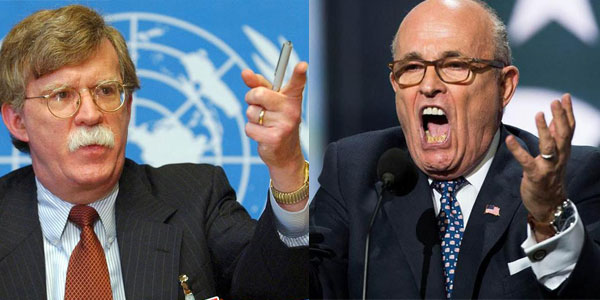Turkish pundits have continued to gush over comments from one or two figures close to president-elect Donald Trump. In the past Michael Flynn, a retired lieutenant general and now confirmed as Trump’s pick for national security advisor, has provided some welcome statements indicating that the Trump administration might act fast to deal with Fethullah Gülen’s extradition. Understandably, right now that issue overshadows all other factors in the running commentary from the Turkish side. But it does make comprehending the broader situation more difficult.
So far two main names, John Bolton and Rudy Giuliani, seem to dominate the conversation around who will be Trump’s secretary of state. And to provide a sense of just how radical these two choices are, even Republicans are aghast (1). No matter which of the two is chosen, the near-term prospects for U.S. foreign relations are sobering.
The first is John Bolton, former U.S. ambassador to the United Nations. He is the embodiment of all my fears about how a Trump presidency would influence U.S. foreign policy. For those who well remember the George “W” Bush years, Bolton is a frighteningly familiar name. An arch neo-conservative and open opponent of the United Nations (2), Bolton would resurrect the radical interventionist policies which brought us the invasions of Afghanistan and Iraq.
George “W” Bush, because of Congressional opposition from his own party, was forced to appoint Bolton as U.S. Ambassador to the United Nations in a recess appointment. That means neo-conservative foreign policy is to the right of the Republican Party establishment. Even current prominent Congressional Republicans have expressed outright opposition to Bolton (3). Bolton’s name should also cause Turkish advocates of “The World is Bigger Than Five” movement to feel alarm. That movement’s supporters, who have received strong support from President Erdoğan and promote democratic, inclusive reform for the United Nations, should look closely at Bolton’s attitudes. Bolton sees the United Nations as useful only to the extent that it can be a tool for U.S. interests abroad.
The second name, former New York mayor Rudy Giuliani, inspires controversy for different reasons. The foremost is that since his political career has been spent entirely in local politics he has no experience in foreign policy. Giuliani’s main claim to political success is that he dramatically reduced crime levels in New York City, but it is unclear how that would translate into foreign policy acumen. Giuliani asserts that New York’s cosmopolitan nature and his own political and business experiences have provided him with ample background for dealing with international issues.
The other reason Giuliani causes concern is his fervent anti-Muslim stance. At the Republican National Convention in August 2016, Giuliani gave a bombastic fifteen-minute speech which targeted U.S. national security and the supposed threat from religiously-motivated extremist militants. Speaking in front of a massive screen with the words “Make America Safe Again” looming over him (4), Giuliani first discussed anti-police violence in terms that verged on race-baiting. Then, halfway through the speech, the former mayor of cosmopolitan New York turned stridently hysterical, roaring “Islamic extremist terrorism — you know who you are and we’re coming to get you!!!” Yes, that person could soon be in charge of formulating U.S. foreign policy and handling American foreign relations, including with Turkey.
Ten days have passed since the U.S. election, and some in the Turkish press finally seem to be looking at figures like Lt. Gen. Michael Flynn in closer detail. What they are finding, as the Turkish phrase goes, iç açıcı değildir (“doesn’t provide relief”). For example, Flynn too has a history of anti-Muslim statements and tweets (5), so the current claims by some of Ankara’s opponents as well as proponents that Flynn could be a “lobbyist” for Turkey (6) shouldn’t be taken seriously. With such prejudices, it is difficult to see how Flynn could construct positive relations with actors in the Muslim world as Trump’s national security advisor (7).
Right now, it appears that several months of confusion will pass as Trump’s administration finds its bearings (if it ever does), during which Turkey is likely to find more freedom of action in Syria than it does now. Obviously there is continuity in the State Department, but in the short run policy could be cloudy as the new political appointees settle in. The extent to which U.S. support for the PYD will continue during the transition is also unclear. Trump’s past comments about the Kurds caused celebration in some quarters (8), but trying to please both Ankara and the PYD will be just as difficult (/read: impossible) for Trump as it was for President Obama. Most likely the transition means that for a number of months Turkey should have a window of opportunity during which U.S. support for the PYD will be either weakened or will cease altogether. The Russian presence in Syria is an additional danger, but currently Turkey and Russia seem to be operating according to spheres of influence.
NOTES
(1) http://www.politico.com/story/2016/11/donald-trump-foreign-policy-231453. This Politico article mentions two important points: (a) Michael Flynn seems to have drawn criticism from the Republican establishment; (b) both Bolton and Giuliani are connected to the Mojahedin-e-Khalq, a violent Iranian leftist militant group or cult that was settled in Iraq following the U.S. invasion in 2003. The Mojahedin-e-Khalq appear to have been used by the U.S. to carry out targeted assassinations in Iran over the past fifteen years.
(2) http://www.liveleak.com/view?i=be1_1188736724
(3) http://www.businessinsider.com/rand-paul-jon-bolton-rudy-giuliani-secretary-of-state-2016-11
(4) https://www.youtube.com/watch?v=g7ZQ035cpLQ; the section in which Giuliani refers to “Islamic terrorists” begins at 5.50. For critiques of Giuliani’s speech, see http://www.slate.com/articles/news_and_politics/politics/2016/07/rudy_giuliani_s_convention_speech_was_a_disaster_too.html
(8) If Breitbart is happy about it, then one should feel extreme concern: http://www.breitbart.com/middle-east/2016/11/15/trump-kurds-iraq-syria-iran/


